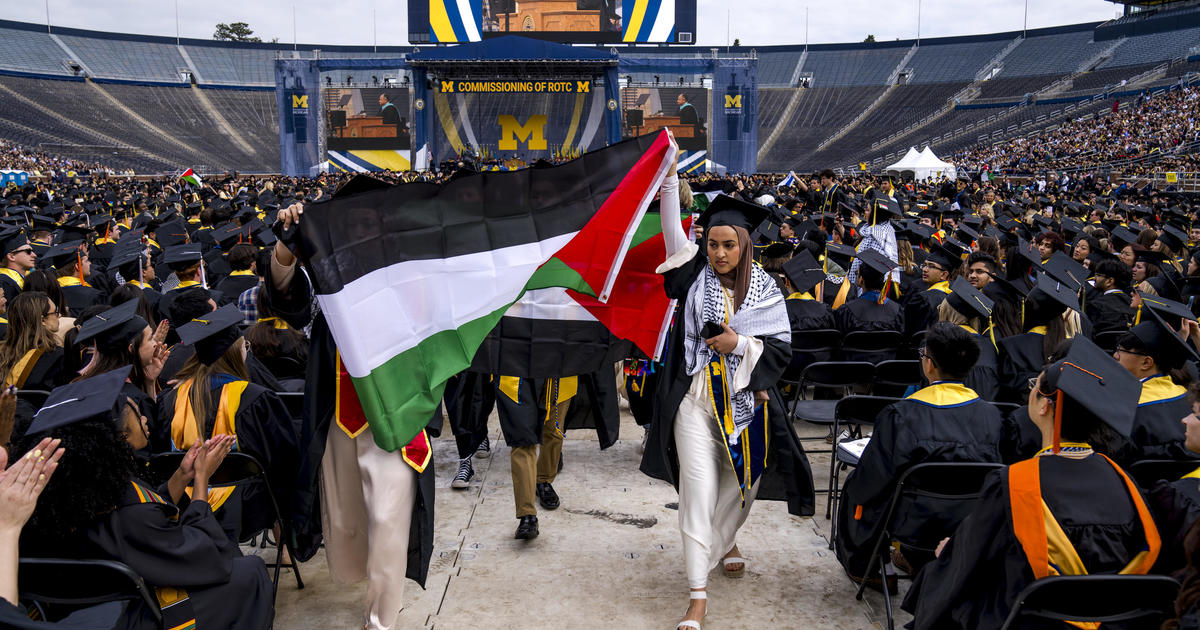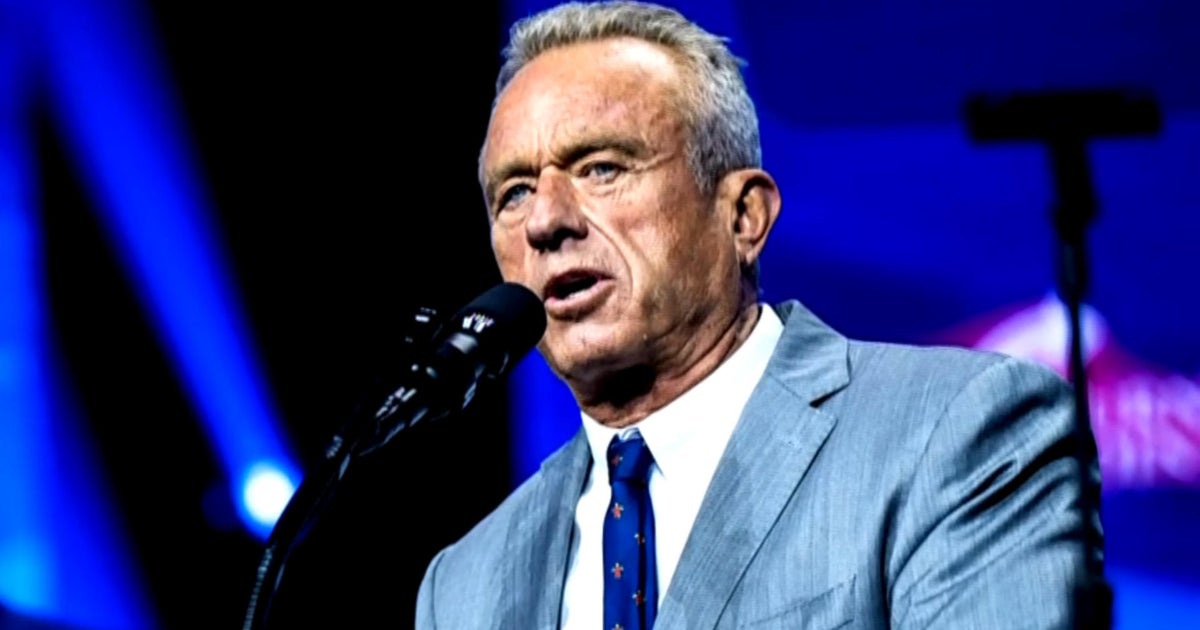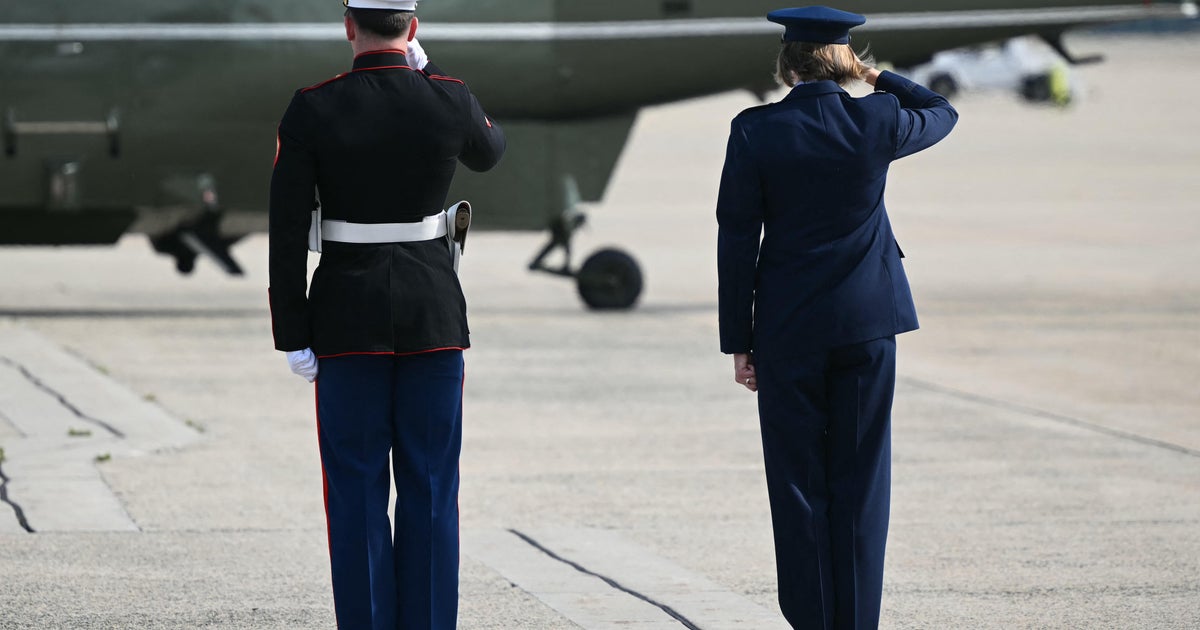CBS News
Pro-Palestinian protesters briefly interrupt University of Michigan graduation ceremony

A graduation ceremony at the University of Michigan on Saturday was briefly interrupted by dozens of pro-Palestinian protesters as higher education institutions across the country holding commencements braced for more demonstrations.
As the commencement ceremony got underway at Michigan Stadium in Ann Arbor, protesters in kaffiyeh and graduation caps unfurled Palestinian flags and posters as they walked through the aisles. They marched toward the stage chanting: “Regents, regents, you can’t hide! You are funding genocide!” the New York Times reported.
One protest banner read: “No universities left in Gaza.” Others were seen waving Israeli flags.
Nic Antaya / Getty Images
Campus police prevented the protesters from reaching the stage.
Above, a plane was spotted flying over the ceremony with a banner that said: “Divest from Israel now! Free Palestine”.
Nic Antaya / Getty Images
Another plane had a different message: “We stand with Israel. Jewish lives matter.”
Nic Antaya / Getty Images
U.S. Navy Secretary Carlos Del Toro paused a few times during his remarks, saying at one point, “Ladies and gentlemen, if you can please draw your attention back to the podium.”
No arrests were reported.
Ahead of its commencement ceremony, the University of Michigan increased security measures – including screening and removal of banners and flags. Tickets would be required for a majority of events, CBS Detroit reported.
Nic Antaya / Getty Images
Laurie McCauley, Michigan’s chief academic officer, told students and staff that the school respects free expression but “no one is entitled to disrupt university activities.”
The university has allowed protesters to set up an encampment on campus but police assisted in breaking up a large gathering Friday night, and one person was arrested.
CBS News reached out to the university for comment.
The ongoing Israel-Hamas war sparked widespread – at times violent – demonstrations at colleges and universities across the country over the last few weeks.
In an attempt to fend off possible disruptions of final exams and graduation ceremonies, a small number of universities stuck deals with protestors. The agreements at schools including Brown, Northwestern and Rutgers stand out amid the chaotic scenes and 2,400-plus arrests on 46 campuses nationwide since April 17. Tent encampments and building takeovers have disrupted classes at some schools, including Columbia and UCLA.
Deals included commitments by universities to review their investments in Israel or hear calls to stop doing business with the longtime U.S. ally. Many protester demands have zeroed in on links to the Israeli military as the war grinds on in Gaza.
The agreements to even discuss divestment mark a major shift on an issue that has been controversial for years, with opponents of a long-running campaign to boycott Israel saying it veers into antisemitism. But while the colleges have made concessions around amnesty for protesters and funding for Middle Eastern studies, they have made no promises about changing their investments.
“I think for some universities, it might be just a delaying tactic to diffuse the protests,” said Ralph Young, a history professor who studies American dissent at Temple University in Philadelphia. “The end of the semester is happening now. And maybe by the time the next semester begins, there is a cease-fire in Gaza.”
Meanwhile, arrests of demonstrators continued elsewhere.
About a dozen protesters who refused police orders to leave an encampment at New York University were arrested early Friday, and about 30 more left voluntarily, NYU spokesperson John Beckman said. The school asked city police to intervene, he added.
NYPD officers also cleared an encampment at The New School in Greenwich Village on the request of school administrators. No arrests were announced.
Another 132 protesters were arrested when police broke up an encampment at the State University of New York at New Paltz starting late Thursday, authorities said.
And nine were arrested at the University of Tennessee, including seven students who Chancellor Donde Plowman said would also be sanctioned under the school’s code of conduct.
The movement began on April 17 at Columbia, where student protesters built an encampment to call for an end to the Israel-Hamas war.
Over 34,000 Palestinians have been killed in the conflict in the Gaza Strip, according to the Health Ministry there. Israel launched its offensive after Oct. 7, when Hamas militants killed about 1,200 people, mostly civilians, and took roughly 250 hostages in an attack on southern Israel.
CBS News
Trump taps RFK Jr. as HHS secretary

Watch CBS News
Be the first to know
Get browser notifications for breaking news, live events, and exclusive reporting.
CBS News
Why Trump chose RFK Jr. for HHS secretary

Watch CBS News
Be the first to know
Get browser notifications for breaking news, live events, and exclusive reporting.
CBS News
U.S. military suicides rose in 2023, persisting despite prevention efforts

Suicides among military service members rose in 2023 continuing a gradual rise in suicides among active-duty forces, persisting despite prevention efforts.
The Defense Department’s annual report on suicides in the military released Thursday said suicides among active-duty military rose from 331 in 2022 to 363 in 2023.
“Admittedly yes, that long-term trend is gradually increasing,” Dr. Timothy Hoyt, Deputy Director of the Office of Force Resiliency at the Defense Department told reporters on a call.
The suicide rate has grown from 17 per 100,000 active duty service members in 2011 to 26 in 2023, according to data released in the annual report for 2023, although the rate decreased for one year from 2020-2021.
Active duty service members who died by suicide in 2023 were largely enlisted males under the age of 30, accounting for 61% of suicides. The most common method of suicide was firearms, at 65%, followed by hanging or asphyxiation, at 28%.
Defense officials said the suicide rates were similar to rates across the U.S. population between 2011 and 2022.
“We are not immune to the factors that drive suicide throughout the U.S., and our service members face, in addition to those, a number of unique military challenges,” Hoyt said.
He added recommendations from the Suicide Prevention Response and Independent Review Committee have given a “mechanism by which we can address as many of those potential risks as possible and make investments in those spaces.”
The Pentagon set up the review committee to provide recommendations to reduce suicide deaths in the military. Last year the committee made a series of recommendations, including broadly improving the delivery of mental health care, addressing stigma and other barriers to care and revising suicide prevention training.
Defense Secretary Lloyd Austin who established the review committee mandated by Congress in 2022 said in a statement that the annual report’s findings “urgently demonstrate the need for the Department to redouble its work in the complex fields of suicide prevention and postvention.” Austin said the Defense Department completed 20 of the 83 committee’s recommendations.
The Pentagon expects to spend about $250 million on suicide prevention in fiscal year 2025, the largest amount of funds the Defense Department has ever invested, Hoyt told reporters.
“A lot of the time where we’ve done initiatives during the past two decades, there’s been insufficient investment in making sure that those have staying power, that we’ve got a long-term implementation of those programs,” Hoyt said.
The total number of suicides across the force, including both active duty and reserve, was 523 in 2023 compared to 493 in 2022.
Suicide is one of the leading causes of death for veterans as well. According to the most recent report from the Department of Veterans Affairs, the suicide rate for 2021 was 33.9 per 100,000, up from 32.6 per 100,000 in 2020.
If you or someone you know is in emotional distress or suicidal crisis, call the National Suicide Prevention Hotline at 988 or 1-800-273-TALK (8255).
For more information about mental health care resources and support, The National Alliance on Mental Illness (NAMI) HelpLine can be reached Monday through Friday, 10 a.m.–6 p.m. ET, at 1-800-950-NAMI (6264) or email info@nami.org.












